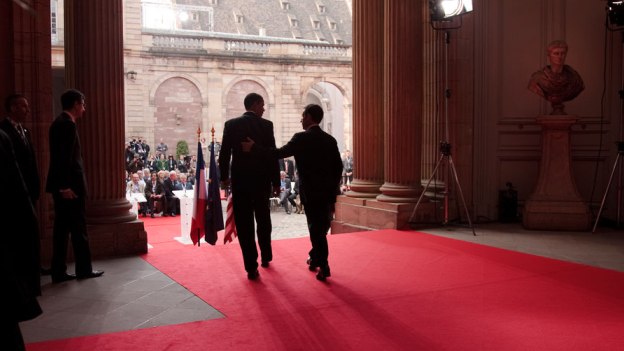
In a speech at Rhenus Sports Arena in Strasbourg, President Obama said America’s relationship with Europe was “at a crossroads” and proclaimed, “We must renew our institutions, our alliances.”
Strasbourg has been known throughout history as a city at the crossroads. . . . So it’s fitting because we find ourselves at a crossroads as well — all of us — for we’ve arrived at a moment where each nation and every citizen must choose at last how we respond to a world that has grown smaller and more connected than at any time in its existence.
[…]
The economic crisis has proven the fact of our interdependence in the most visible way yet. Not more than a generation ago, it would have been difficult to imagine that the inability of somebody to pay for a house in Florida could contribute to the failure of the banking system in Iceland. Today what’s difficult to imagine is that we did not act sooner to shape our future.
Now, there’s plenty of blame to go around for what has happened, and the United States certainly shares its — shares blame for what has happened. But every nation bears responsibility for what lies ahead, especially now, for whether it’s the recession or climate change, or terrorism, or drug trafficking, poverty, or the proliferation of nuclear weapons, we have learned that without a doubt there’s no quarter of the globe that can wall itself off from the threats of the 21st century.
The one way forward — the only way forward — is through a common and persistent effort to combat fear and want wherever they exist. That is the challenge of our time — and we can not fail to meet it, together.
[…]
At the crossroads where we stand today, this shared history gives us hope — but it must not give us rest. This generation cannot stand still. We cannot be content merely to celebrate the achievements of the 20th century, or enjoy the comforts of the 21st century; we must learn from the past to build on its success. We must renew our institutions, our alliances. We must seek the solutions to the challenges of this young century.
This is our generation. This is our time. And I am confident that we can meet any challenge as long as we are together.
Such an effort is never easy. It’s always harder to forge true partnerships and sturdy alliances than to act alone, or to wait for the action of somebody else. It’s more difficult to break down walls of division than to simply allow our differences to build and our resentments to fester. So we must be honest with ourselves. In recent years we’ve allowed our Alliance to drift. I know that there have been honest disagreements over policy, but we also know that there’s something more that has crept into our relationship. In America, there’s a failure to appreciate Europe’s leading role in the world. Instead of celebrating your dynamic union and seeking to partner with you to meet common challenges, there have been times where America has shown arrogance and been dismissive, even derisive.
But in Europe, there is an anti-Americanism that is at once casual but can also be insidious. Instead of recognizing the good that America so often does in the world, there have been times where Europeans choose to blame America for much of what’s bad.
On both sides of the Atlantic, these attitudes have become all too common. They are not wise. They do not represent the truth. They threaten to widen the divide across the Atlantic and leave us both more isolated. They fail to acknowledge the fundamental truth that America cannot confront the challenges of this century alone, but that Europe cannot confront them without America.
So I’ve come to Europe this week to renew our partnership, one in which America listens and learns from our friends and allies, but where our friends and allies bear their share of the burden. Together, we must forge common solutions to our common problems.
So let me say this as clearly as I can: America is changing, but it cannot be America alone that changes. We are confronting the greatest economic crisis since World War II. The only way to confront this unprecedented crisis is through unprecedented coordination.
There was much more to the speech, which I commend to you in full.
Whether this call to action will be met with, well, action remains to be seen. But the tone here is exactly right. Leaders on both sides of the Atlantic have long paid lip service to the need to work together but usually expecting that this means that others will heed the obvious wisdom of their policies and abandon their own short-sighted foolishness.
That’s not the path to partnership but to continued erosion of the most important alliance in the history of the world.
James Joyner is managing editor of the Atlantic Council. White House Photo by Chuck Kennedy.
Image: obama-france.jpg
